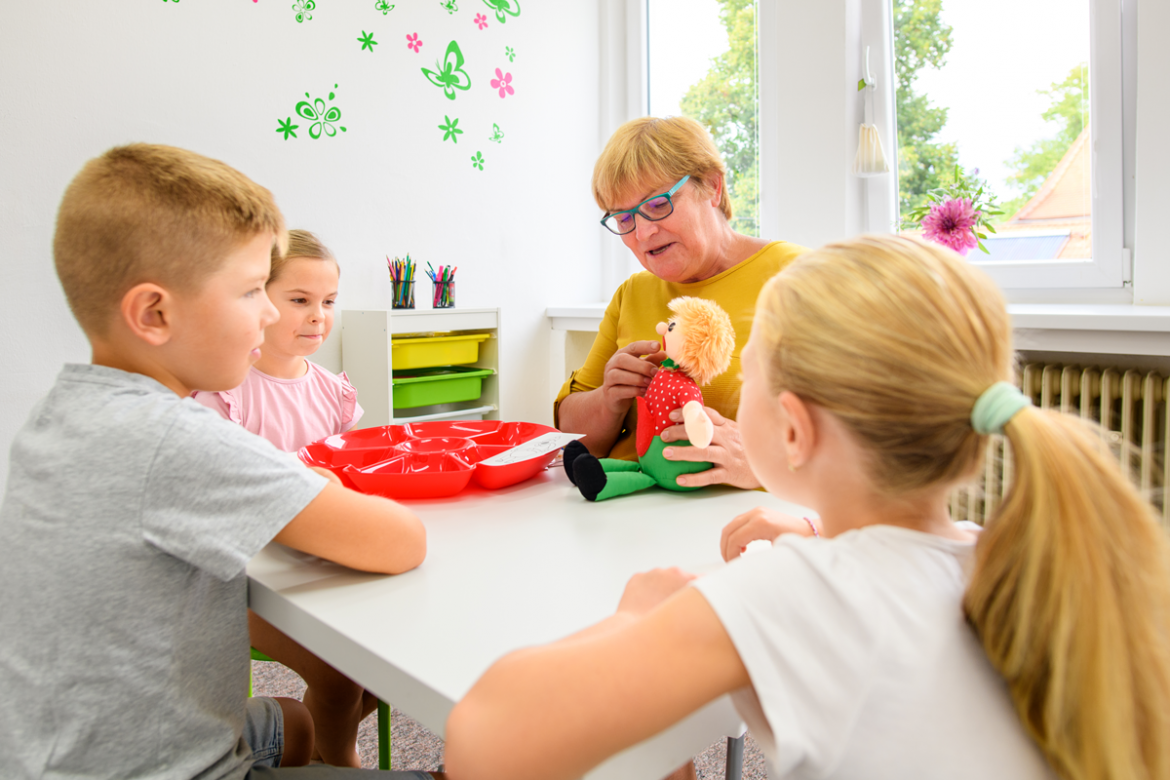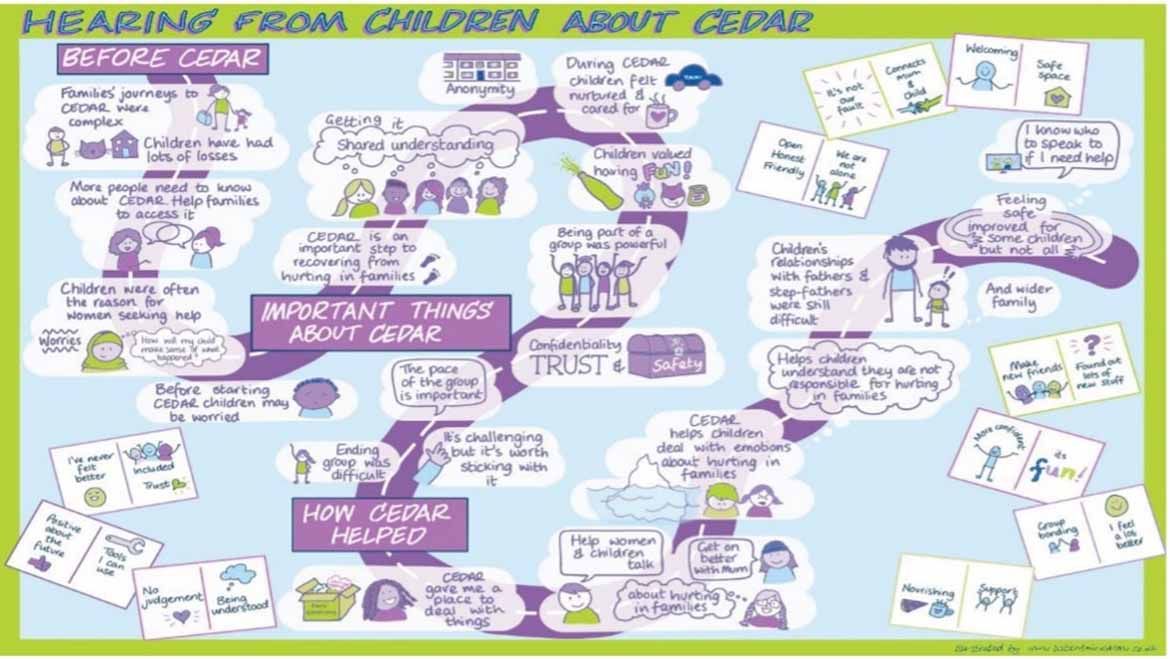What is the Cedar model?
The Cedar (Children Experiencing Domestic Abuse Recovery) programme is Scotland’s leading evidence-based recovery programme available for children and young people aged 0-18. Cedar supports children in groupwork settings to help them to better understand and recover from the trauma they have experienced from domestic abuse.
Recognising that mothers are best placed to support their child through their recovery, Cedar also works with mothers in concurrent group sessions to help strengthen attachment between mother and child and repair the bond that is so often damaged by domestic abuse.
Cedar’s trauma recovery model provides children and young people with a greater understanding of the dynamics of domestic abuse and why abuse occurs and that they are not responsible for the abuse– supporting children and young people to develop skills to cope with a range of issues which directly relate to their experiences of domestic abuse.
Four local projects in Angus, Perth & Kinross, Renfrewshire, and West Dunbartonshire have contributed their learning and expertise to this case study.

Why is Cedar effective?
Cedar follows a strengths-based approach and builds resilience in children and young people recovering from the trauma of domestic abuse. The programme is built on early intervention, a gendered analysis of domestic abuse and is trauma-informed. Cedar uses a psycho-educational model, and helps to build on and highlight mums’ and children and young people’s current strengths.
The Cedar programme has been proven to support children and their mothers to recover from the trauma they have experienced by helping them to understand that domestic abuse is not their fault, increasing their knowledge of safety, wellbeing and trauma and strengthening the mother-children relationship.
Cedar is an example of effective health and wellbeing intervention for children and young people, families, and communities. Cedar’s recovery programme model is key in responding to and preventing violence against women and girls (VAWG). Without appropriate support, women, children and young people can face challenges in recovering from the impact of domestic abuse.
Cedar responds to key ambitions around safety and wellbeing in Scotland’s national policies and strategic priorities, including areas such as justice, equalities, GIRFEC, public health, mental health, and children’s rights. The recent review of funding and commissioning of violence against women and girls (VAWG) services in Scotland recommended that there should be an ambition to make Cedar available in every local authority.

Cedar artwork in The Independent Strategic Review of Funding and Commissioning of VAWG Services
Cedar has made such a difference to my family’s life. The relationship I have with my son has strengthened beyond words. We actually have proper conversations every day!
Outline of Cedar model
Cedar is a holistic, evidence-based, child-centred recovery programme which utilises group work intervention that is child-focused, strengths-led and peer-centred. The 10/12-session programme is designed to mitigate the long-term impact of domestic abuse on children and young people. The group work programme focuses primarily on the core themes of: safety, emotional resilience, domestic abuse education and awareness, improving communication between child and caregiver about abuse, problem solving self-care and support, and hope.
Cedar is about working together with women, children and young people to effect change while acknowledging that they are the experts in determining what will work for their family. Groups are co-delivered by volunteer trained colleagues from non-specialist partner organisations and agencies. Co-facilitators have acknowledged the power of hearing accounts first hand and have emphasised how delivering Cedar has supported their professional development.
I had worries the size of a big balloon, but Cedar helped the balloon to go POP!
Adaptions of the Cedar model
Local Cedar projects have made adaptions based on various needs of mothers and children:
- Fife Council has developed the EYDAR (Early Years Domestic Abuse Recovery) programme to provide targeted support to younger children. EYDAR is an 8-week therapeutic group work programme supporting mothers of babies and toddlers (0-4 years).
- Angus has on occasion adapted the Cedar model to accommodate siblings, as the eligibility criteria does not allow siblings in the same group. To allow siblings, and importantly their mums, to experience Cedar at the same time, Angus have offered groupwork to one sibling, and 1:1 Cedar to the other. This approach enabled a whole family approach – all could discuss the issues as a family at home each week but were experiencing Cedar separately.
- Perthshire Cedar groups are delivered during term time. Children are in groups with children of a similar age and stage - for example, 5-8 years & 8-12 years. Groups for young people are delivered after school in the evening. Transport is provided so that children from different areas can attend group which takes place in Perth city.
- Renfrewshire have found that children prefer the family centred assessments to take place out with school to allow privacy. They also run evening groups to allow working mums to attend a group they would otherwise have no access to.
- West Dunbartonshire Cedar Co-ordinators have also adapted the mother’s group work programme so that children who are looked after by kinship or foster parents can attend a Cedar Children’s group work programme and be supported by their carer. The kinship/foster carer programme is primarily a psycho-educational programme which aims to increase carer’s understanding of the traumatic impact of domestic abuse to children and young people, research into neurophysiology and child development. The programme also aims to support carers to apply a trauma informed approach when caring for children affected by domestic abuse and any of the wider adverse childhood experience (ACE) intersections that children in care have often experienced.
Successes and benefits of Cedar
Key benefits of Cedar
- The strengths-based child-centred approach is focused on helping children understand domestic abuse and recognise that it is not their fault, whilst the emphasis on developing safety plans is to minimise risk in the event of further exposure to abuse.
- Cedar’s groupwork environment reduces isolation, gives mums and children the opportunity to build on their strengths and build connections with the wider community through peers, practitioners and other support services.
- Cedar groups are co-delivered by trained volunteer facilitators from across public and third sectors. This helps increase understanding of domestic abuse and strengthens the whole system’s response to children who need support.
- The programme can be adapted to suit different age groups and genders and the context in which children and young people are living. Cedar is not a ‘one size’ programme and can be adapted accordingly, but the foundational structure of concurrent groups and topics covered in each session provide the necessary framework for recovery.
Outcomes of Cedar
- Children and mothers have an increased understanding of domestic abuse;
- Children and mothers have an increased sense of safety and wellbeing;
- Children and mothers have a strengthened relationship;
- Mothers have an increased understanding of the impact of domestic abuse on children; and
- Co-facilitators have an increased understanding of the complexities of domestic abuse.
As a case holding social worker, I can clearly identify CEDAR as a relevant therapeutic opportunity for the family to work through issues as victims of domestic abuse.
Testimonials
Mothers:
- “Where do I start. Cedar has made such a difference to my family’s life. The relationship I have with my son has strengthened beyond words. We actually have proper conversations every day! As a family, we use the tools Cedar gave us to express our feelings in a positive way. I’ve learnt its ok to be angry, not to hold it in or try and hide your emotions.”
- “It was a safe space for him, where he could be at ease with his own thoughts and emotions, with others who have gone through something similar.”
- “I found the group really supportive, it’s the first time I’ve ever been in a room with people who have gone through the same thing.”
- “My son had a terrible time at school with teachers not understanding trauma and what he went through. He learned all about the rights of the child and how it was always important for the child to have a voice.”
- “You look forward to another day now, before you couldn’t wait for the wait for the day to end.”
Children and young people:
- “Don’t be scared to tell anyone how you felt about what happened at home – it’s all safe here.”
- “The boys from group…I trust them more than my friends, because I have told them things I haven’t told my friends because they have gone through it too.”
- “I had worries the size of a big balloon, but Cedar helped the balloon to go POP!”
- “If someone was in trouble, I wouldn’t sit there and let them suffer. Cedar is a time when you say what you want to say. You meet friends, they have had problems too it’s not just you.”
Referrer
- “As a case holding social worker, I can clearly identify CEDAR as a relevant therapeutic opportunity for the family to work through issues as victims of domestic abuse.” – Social Worker who referred to Cedar.
Learning
Challenges for local Cedar projects:
- Lack of referrals results in small numbers available when creating groups. This can mean groups which are smaller than ideal. If a child drops out or is off the group is less effective. Local projects highlighted that lack of referrals is despite delivering many presentations and promoting on social media.
- Working in rural areas can be challenging in terms of transport and getting children to a central area.
- Limited travel budgets to manage the logistics needed to run Cedar.
- It can be hard for Mums to engage in group work due to the trauma that they have experienced, and it has impacted on their mental health.
- The availability of community space to run Cedar groups from has increasingly reduced in recent years.
Key learning points on what has worked particularly well for local projects:
- Several areas suggested offering mums’ 1:1 works well as an option for the programme as getting a mums’ group together is very challenging for numerous reasons such as work commitments and mental health. 1-1 support allows more person-centred support. Perth and Kinross have also developed family sessions with mothers and children if needed.
- Angus regularly gather feedback from children on they have liked, not liked, and the main messages they have taken – and ask at the end of each programme for advice for the next group of children.
- Renfrewshire carry out a family-centred assessment in preparation for the groupwork which focuses on the impact of living with domestic abuse.
- West Dunbartonshire highlighted that it is helpful to ensure Cedar programmes are responsive to the emerging research in neuro-physiology, child development, trauma literacy, ACEs. They have considered how participants consume information and their sources of information, as well as trends in parenting and responses to trauma, neurodiversity and language.
Angus (Angus Women’s Aid): Jody Docherty, jody@anguswomensaid.co.uk, Catriona Mclaren, catriona@anguswomensaid.co.uk
Perth and Kinross (Perthshire Women’s Aid): Kim Brown & Laura Kelly, Domestic Abuse Family Support Service, Perthshire Women’s Aid, Perth, contactus@perthcedar.co.uk
Renfrewshire (Renfrewshire Council): Karen McNulty, karen.mcnulty@renfrewshire.gov.uk, Ashley Ross, ashley.ross@renfrewshire.gov.uk
West Dunbartonshire (West Dunbartonshire Council): Carol Young, carol.young@west-dunbarton.gov.uk